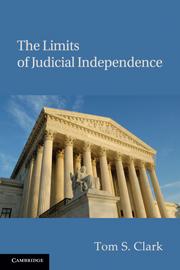Book contents
- Frontmatter
- Contents
- List of Tables
- List of Figures
- Acknowledgments
- 1 Introduction
- 2 A Political History of Court-Curbing
- 3 Conditional Self-Restraint
- 4 Court-Curbing and the Electoral Connection
- 5 Public Support and Judicial Review
- 6 Ideological Implications of Court-Curbing
- 7 The Limits of Judicial Independence
- Appendix A Elite Interview Methodology
- Appendix B Court-Curbing Bills, 1877–2008
- Bibliography
- Index
1 - Introduction
Published online by Cambridge University Press: 05 August 2012
- Frontmatter
- Contents
- List of Tables
- List of Figures
- Acknowledgments
- 1 Introduction
- 2 A Political History of Court-Curbing
- 3 Conditional Self-Restraint
- 4 Court-Curbing and the Electoral Connection
- 5 Public Support and Judicial Review
- 6 Ideological Implications of Court-Curbing
- 7 The Limits of Judicial Independence
- Appendix A Elite Interview Methodology
- Appendix B Court-Curbing Bills, 1877–2008
- Bibliography
- Index
Summary
Among all of the institutional features of the American Constitution, none is more significant than the separation of powers. Separation of powers represents perhaps the most important contribution the American experiment has made to constitutional democracy throughout the world. With its roots in Montesquieu's insight, the notion of setting power to counteract power has grown into a principle of limited self-government that motivates constitutional democracies in every corner of the globe. In the context of the American judiciary, the separation of powers is a particularly interesting and perplexing institution. Although the courts are often considered strong institutions with the power to exercise a constitutional veto over majoritarian politics, the federal judiciary has been referred to as “the least dangerous branch,” following from Alexander Hamilton's famous assertion that the Court “is possessed of neither force nor will, but merely judgment.” These seemingly diminutive descriptions of the courts are due to their lack of constitutional authority of enforcement and their reliance on action by the elected branches to give effect to judicial decisions. That is, the judiciary has “neither purse nor sword” and relies instead on legislative or executive powers for its institutional efficacy. Indeed, the separation of powers among governing institutions is a hallmark of the American Constitution and was a guiding principle for the Framers. In this vein, James Madison observed in The Federalist that each of the original states had chosen to divide governing powers among multiple institutions while also providing overlap and cross-checking vetoes.
- Type
- Chapter
- Information
- The Limits of Judicial Independence , pp. 1 - 24Publisher: Cambridge University PressPrint publication year: 2010



